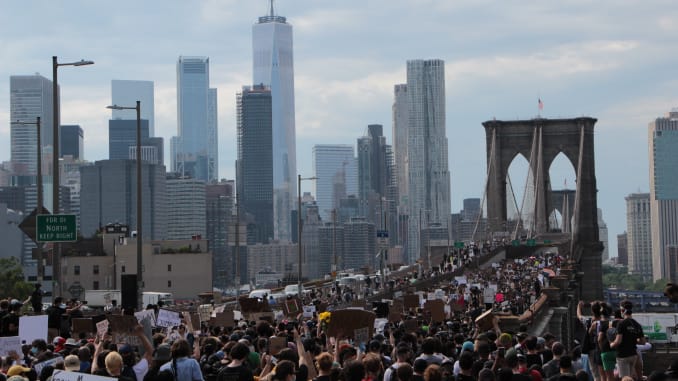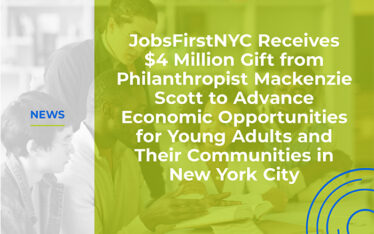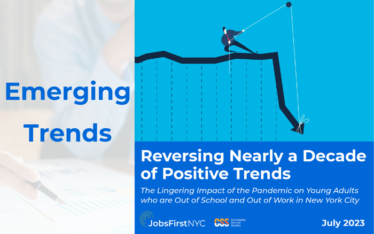At the March on Washington for Jobs and Freedom in 1963, Dr. Martin Luther King gave his iconic “I Have A Dream” speech, where he asked America to “make real the promise of democracy.” Dr. King said, “when the architects of our republic wrote the magnificent words of the Constitution and the Declaration of Independence, they were signing a promissory note to which every American was to fall heir. This note was a promise that all men, yes, black men as well as white men, would be guaranteed the unalienable rights of life, liberty, and the pursuit of happiness. It is obvious today that America has defaulted on this promissory note insofar as her citizens of color are concerned.” This speech and his life’s work were centered on civil and economic rights and equality in America for Black people. This speech was delivered nearly 60 years ago, yet it is as evident now, as it was then, that America continues to fail to fully deliver on this promise.
The time is now to make the type of systemic and cultural changes that will deliver equity and equality without malice to Black Americans. Similar to the unending racial injustices and public outcry that led up to the 1963 public address when Dr. King spoke about his dream for Black Americans and for America, today many Americans are again standing up for the human rights of Black people. It is important to not just respond to this “moment” spurred by the death of George Floyd, but to the too many injustices that have gone unacknowledged and to the totality of racial inequities—public, private, and institutional—that combined have created systemic racism and resulted in Black people being oppressed solely based on the color of their skin. While a broad swath of people representative of today’s America unite to fight discrimination against Black people and other disenfranchised communities, and to “dramatize a shameful condition,” as noted by Dr. King, there needs to be a frank discussion about anti-Blackness and the dehumanization of Black skin.
While the breadth, depth, and intensity of our outcry to the recent injustices against Black Americans is noted as larger than anything that we have seen since the 1960’s, and we are expressing surprise that public demonstrations continue after four weeks, we must remind ourselves that from the formation of Black Lives Matter in 2013 in response to the death of Trayvon Martin, and through 2014 and 2015 with the deaths of Michael Brown in Fergurson, where there were over 400 days of demonstrations, followed by the deaths of Eric Garner, Tamir Rice, and Philando Castile, we have had almost six years of ongoing demonstrations. Despite these demonstrations and our being witness to more cruel loss of lives—Ahmaud Aubrey, Breonna Taylor, Rayshard Brooks and countless other Black Americans that did not make the national news—we are once again here today having the same conversations. If we want change to happen, to sustain, to make America fulfill its promise to Black people, we cannot only count the days of demonstration, we must count the actions that end the dehumanization of an entire race. Black people are tired, frustrated, and have lost patience for incremental change. The time is now for the great American awakening and, as Dr. King noted in his speech, “this is no time to engage in the luxury of cooling off or to take the tranquilizing drug of gradualism.” Another generation of Black children cannot be born into and live their whole lives with the mental, psychological, economic, and social devastation of racism and the systems that support it.
The time is now for the equal rights for Black Americans that Dr. King dreamt of. It is the time to adopt and invest in anti-racism policies and practices and to recognize racism and institutional racism as an economic and public health crisis. Within this broader catchall for all kinds of racist ills, we should also recognize anti-Blackness as a danger to those who are dehumanized based on their Black skin. Racism is a danger to the health and economic security of Black people, other marginalized people of color, and all Americans. The cost is measurable to those who suffer from its infliction—health, social, financial, and to their overall well-being as Americans. Until racism is targeted for eradication, in that it becomes a part of the national civil rights agenda backed by the full power of the government, we will continue to see incremental changes forced by the type of civil unrest we see today, and Black people will not see the transformative reformation needed to be rid of a virus we have long had a cure for.
At JobsFirstNYC, we recognize that the “quicksand of racial injustice” threatens the well-being of young men and women of color. Fourteen years ago, JobsFirstNYC was launched to improve the economic outcomes for young adults in historically disenfranchised communities. Our purpose is to create and advance solutions that break down barriers and transform the systems supporting young adults and their communities in the pursuit of economic opportunities. Through JobsFirstNYC’s innovative partnership initiatives, together with 150 partners, over 6,000 young adults have been reconnected to economic opportunities and advancement. We recognize that until racial, social, economic and justice inequities are fully addressed, many young adults and the communities they live in will continue to struggle to access economic opportunities and economic mobility.
JobsFirstNYC’s Board of Directors and staff members stand in solidarity with protestors and maintain our commitment to improving economic outcomes for young adults and the communities in which they live. Since our launch, we have been working on the advancement of the following strategies to achieve racial and economic justice:
- Invest in the Economic Security of Young Adults. Young adult development and economic advancement are critical to changing the long-term economic mobility of disenfranchised communities. Since the Great Recession, despite increases in employment, almost all gains for 18- to 24-year-olds have been in part-time, lower-wage, and direct-service jobs, leaving most young adults underemployed. This is especially true for young adults of color and those living in disenfranchised communities. In the report “The Importance of Investing in People of Color”, the Center for American Progress notes that by 2043, the majority of America’s workforce will be people of color, so it is critical to invest in the development of our future workforce. Now, with an estimated 11 million young adults unemployed as a result of COVID-19, to improve their long-term economic opportunities, we need to invest in a Single-System Strategy. One that engages young adults earlier around career and post-secondary options while in high school; provides understanding and options for better-paying careers and jobs; reconnects them to economic opportunities and advances their economic well-being by connecting them to education and skills training; and, creates advancement opportunities for those who are marginally attached to economic opportunities.
- Invest in the Financial Stability of Workers in their Communities. The majority of people who live in disenfranchised communities work bad jobs with minimal benefits and low-wages that do not pay enough to meet the financial needs and stability of families. In the report Make Bad Jobs Better, it is noted that “when a local economy hosts a large number of bad jobs, the community is forced to subsidize those bad jobs by paying for additional public benefits, tax credits, and healthcare costs—all while suffering a sluggish economy in which local workers have too little income to generate robust economic growth”. Despite the pre-COVID-19 economic boom, “the occupations that employ the largest numbers of low-income youth and adult workers have experienced higher than average real wage declines—from -5 percent for retail workers, to -6.6 percent for personal care workers, to -7.7 for food prep workers”. To improve the financial stability of low-income workers, we believe the issues of stagnant wages and financial instability needs greater attention with a focus on the role that employers can play in providing good jobs that produce better outcomes for them and their workers. Government should expand the Shared Work Program model to include low-income workers access to supplemental income, beyond income-based social benefits, that increase the size of the workers’ paycheck/income. As tested in JobsFirstNYC’s Seasonal Talent Exchange initiative or Rhino Foods Employee Exchange Program, we need to build out labor exchange platforms that can create complementary partnerships between employers connecting them to talent while providing greater employment opportunities to workers who are underemployed.
- Invest in Community Economics. The threat to the social and economic well-being of Black Americans and other people of color living in historically disenfranchised communities has never been more evident. COVID-19 exposed the deep fissures that have been growing for generations. Black and Latinos were especially hit hard financially. The young adults we are in service to live in these communities that need the resources, trust, and autonomy to create social and economic changes to improve the lives of their residents. To ensure the economic well-being of these communities, investments must be made in local human service institutions to build partnerships to leverage resources that will scale on-the-ground capacity.
As demonstrated through JobsFirstNYC’s partnership initiatives like YouthWINS and LESEN, a collaborative approach enables human service institutions to better respond to the long-term, historical disadvantages caused by underinvestment, racism, over-policing, high unemployment, low-wage jobs, and other prolonged systemic failures brought on by the conditions of poverty. There is a continuing decline in small business ownership, especially businesses owned by Black people, further exacerbated by COVID-19. We must invest in entrepreneurship training and the growth of small businesses in disenfranchised communities, where the resulting jobs and incomes can advance the economic well-being of local residents. Due to the need for more localized economic activities, large anchor institutions often doing business in these communities—hospitals, universities, cultural organizations—can do more to invest in community economic growth by contracting with or helping local businesses to develop the capacity to provide goods and services to their institutions, which could bring far more income to and build wealth in a local neighborhood, beyond just hiring residents.
In addition to our work over the past fourteen years, JobsFirstNYC is expanding our commitment to include a focus on identifying, lifting up, and advancing the following solutions in our work around community economic solutions. As such, we are calling for increased investment in the following areas:
4. Invest in Community Health and Wellness. People who live in poverty encounter multiple traumatic experiences, negatively impact whole families and communities. Further, a growing body of research suggests that the effects of poverty and racism include trauma. Years of racial oppression have had long-term physical and psychological impacts on Black Americans, who die at disproportionately high rates due to chronic illness. Black Americans have less access to healthcare and are less likely to have insurance. The impact of COVID-19 on communities of color is devastating, and a recent Pew report noted that nationwide, Black Americans made up a notable share of hospitalizations, high when compared to their population size. In New York City, “death rates per 100,000 people are highest among Blacks and Hispanics,” twice the rate as white people. To support health and wellness of communities impacted by the trauma of racism and poverty: invest in the development of a community-level health and wellness agenda; support community-wide mental wellness that is age agnostic; and, address the intergenerational impact of trauma and the physical and psychological effects on people who experience poverty and racism.
5. Invest in Community Safety and Security. Mounting evidence shows that the majority of Black Americans do not trust the police and are afraid of reaching out to them for protection. There is seldom a day that goes by where we are not told about young adults’ negative engagement with the police in their communities—in schools, on the streets, and even simply sitting in front of their homes. The prevalence of criminal records among Black people for minor infractions would be far less if the police were not the ones called upon to solve non-criminal issues, such as mental health challenges, and were not more likely to arrest Black people because of bias in policing. A young person with a criminal justice record immediately loses access to the type of economic opportunities that could lead to a better life. The lifetime impact of this loss can be felt for generations and contributes to the loss of income and wealth in Black communities. The time is now to reimagine community public safety and redefine policing by separating criminality from everyday quality of life and social issues.
Many organizations are making new commitments to racial equity, which is important and necessary. Change will take dedicated and sustained work from all of us. JobsFirstNYC is doubling down on our commitment to racial and economic justice, and adding our voice to the winds of change rushing through our streets, board rooms, and courtrooms. This change is led by young people—by the young adults we serve—and is necessary for their survival, for their futures, and for the well-being of our nation. Their leadership will guide us in our desperately needed transformation. As Dr. King proclaimed in his speech, “We refuse to believe that there are insufficient funds in the great vaults of opportunity of this nation. And so, we’ve come to cash this check, a check that will give us upon demand the riches of freedom and the security of justice.”





